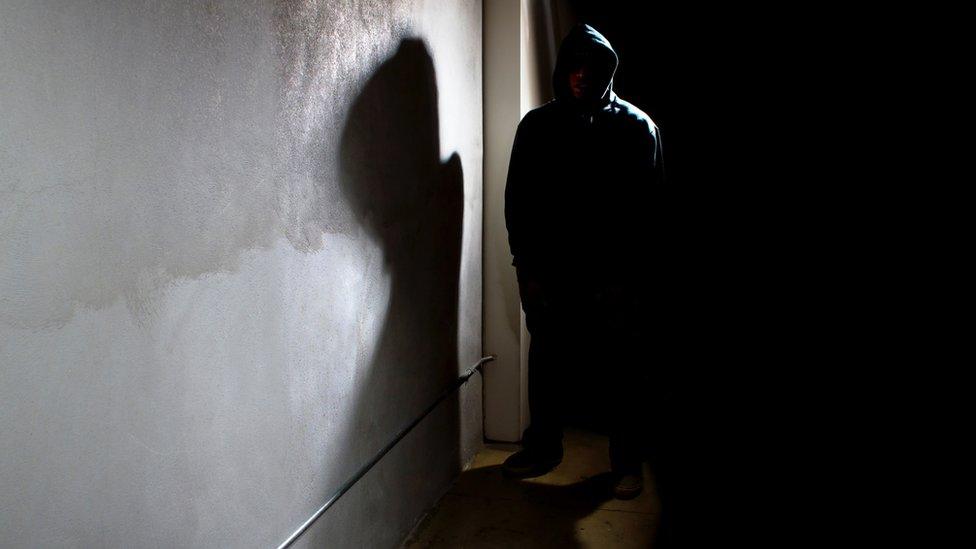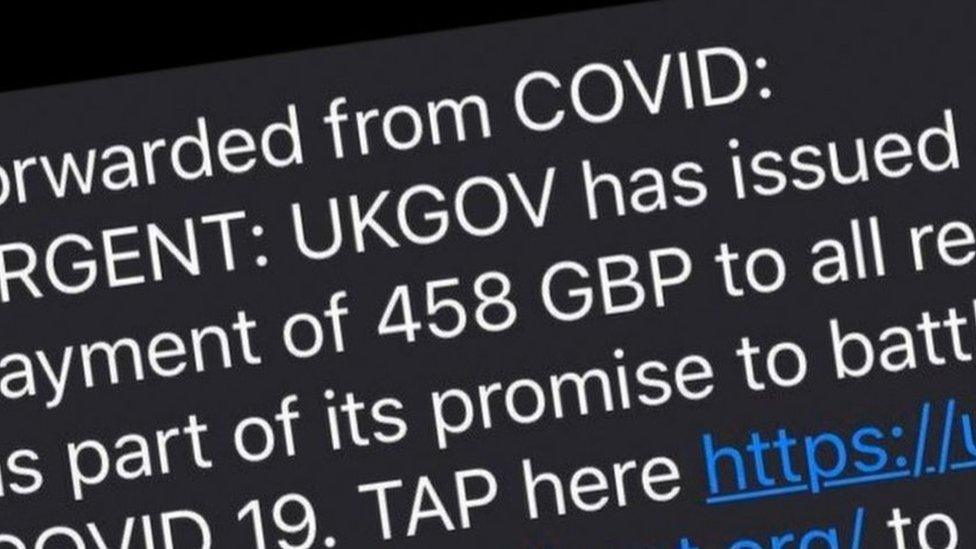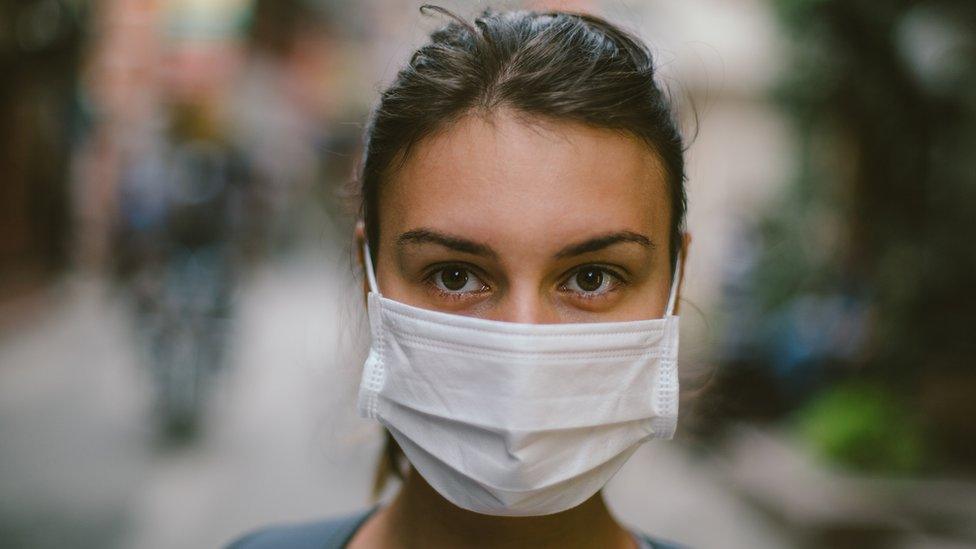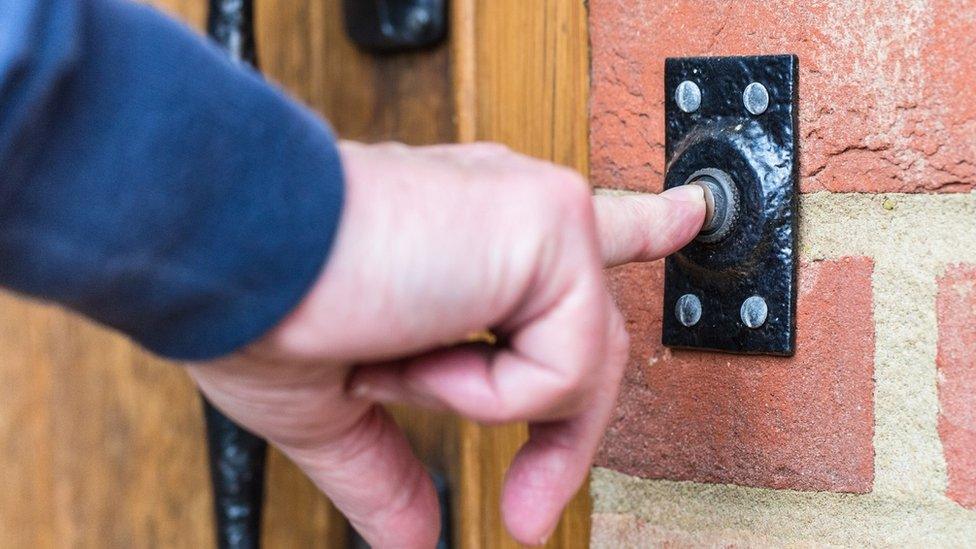Coronavirus conman barges in on 83-year-old woman
- Published

Doorstep criminals are adapting old scams (picture posed by model)
A coronavirus conman barged into the home of an 83-year-old woman claiming he was "from health and safety" and needed to check her property.
The potential thief demanded £220 from the lady, who has dementia and was following guidance to stay at home amid the outbreak.
He left empty-handed after she told him she only had 20p in cash with her.
Trading standards officers say this is an example of how con artists are exploiting the current crisis.
Years-old doorstep crimes and frauds are being revised to steal from people left alone and vulnerable by the coronavirus restrictions.
Community spirit
Cases of kindness within communities still far outnumber doorstep crimes, but those on the front line say there is an increasing risk of exploitation.
In the case of the 83-year-old woman, the cold caller repeatedly banged on the door and said she would be arrested if she did not let him in.

AVOIDING CONTACT: The rules on self-isolation and exercise
LOOK-UP TOOL: Check cases in your area
MAPS AND CHARTS: Visual guide to the outbreak
VIDEO: The 20-second hand wash

Trading standards officers said cases of doorstep crime and other scams were rising, and urged family and neighbours to look out for the vulnerable, albeit from an appropriate distance. With only about 5% of scams reported to the authorities, they are also encouraging people to come forward if they have been targeted so cases can be investigated.
Other doorstep crimes reported in recent weeks include:
Fake and dangerous hand sanitisers, face masks and swabbing kits sold online and door-to-door
Collections supposedly for charities helping the vulnerable, but are actually straightforward theft
Gangs arriving unannounced to "disinfect" driveways, then charging well over the odds
National Trading Standards (NTS), the frontline UK consumer protection body, said thieves were also offering to shop for housebound residents, but stealing the cash they were given.
Louise Baxter, head of the NTS scams team, said: "As people stay indoors to prevent the spread of Covid-19, criminals are preying on people in vulnerable situations who are isolated and living alone.
"There has never been a more important time for neighbours to look out for each other."
The organisation has previously warned that members of the gangs involved in such criminality could be victims of modern slavery themselves.
Some have their passports, ID and money taken by gangmasters who then put them to work, paying them poorly or not at all.

How to report a scam
Contact the Citizens Advice consumer helpline, external to seek advice and report cases
Action Fraud is the reporting service, external for fraud and cyber crime
Online training to guard against scams is available from Friends Against Scams, external

Trading standards officers, who would normally visit victims, alongside other support charities and possibly police officers are themselves stretched and subject to social distancing guidelines.
Katherine Hart, lead officer for doorstep crime at the Chartered Trading Standards Institute, said that while officers might not be able to visit in person, they could still investigate and urged people to report crimes. Without a complaint, no investigation can be started.
Officers were able to issue advice remotely, and community forums were playing a vital role in issuing warnings, she said.

Scam texts like this one have become more common
Alongside doorstep crime, there have been widespread warnings about online, text and telephone scams which use coronavirus as a trigger to attempt to steal personal information and drain bank accounts.
These range from unsolicited emails and texts claiming to be from utility providers, asking for banking and other details, to offers of refunds for cancelled holidays on fake websites. One suggests people have been fined for leaving their home during the outbreak, playing on people's fears.
Many text messages impersonate the authorities and use links to fake sites, or to install malware on computers.
Katy Worobec, managing director for economic crime at banking trade body, UK Finance, told BBC 5 Live Breakfast that "it would have helped" if the government had not put a link in its coronavirus advice text message to everybody in the UK.
"It has opened the floodgates a little for fraudsters to copy that idea," she said.
- Published20 March 2020

- Published26 March 2020

- Published27 November 2019
